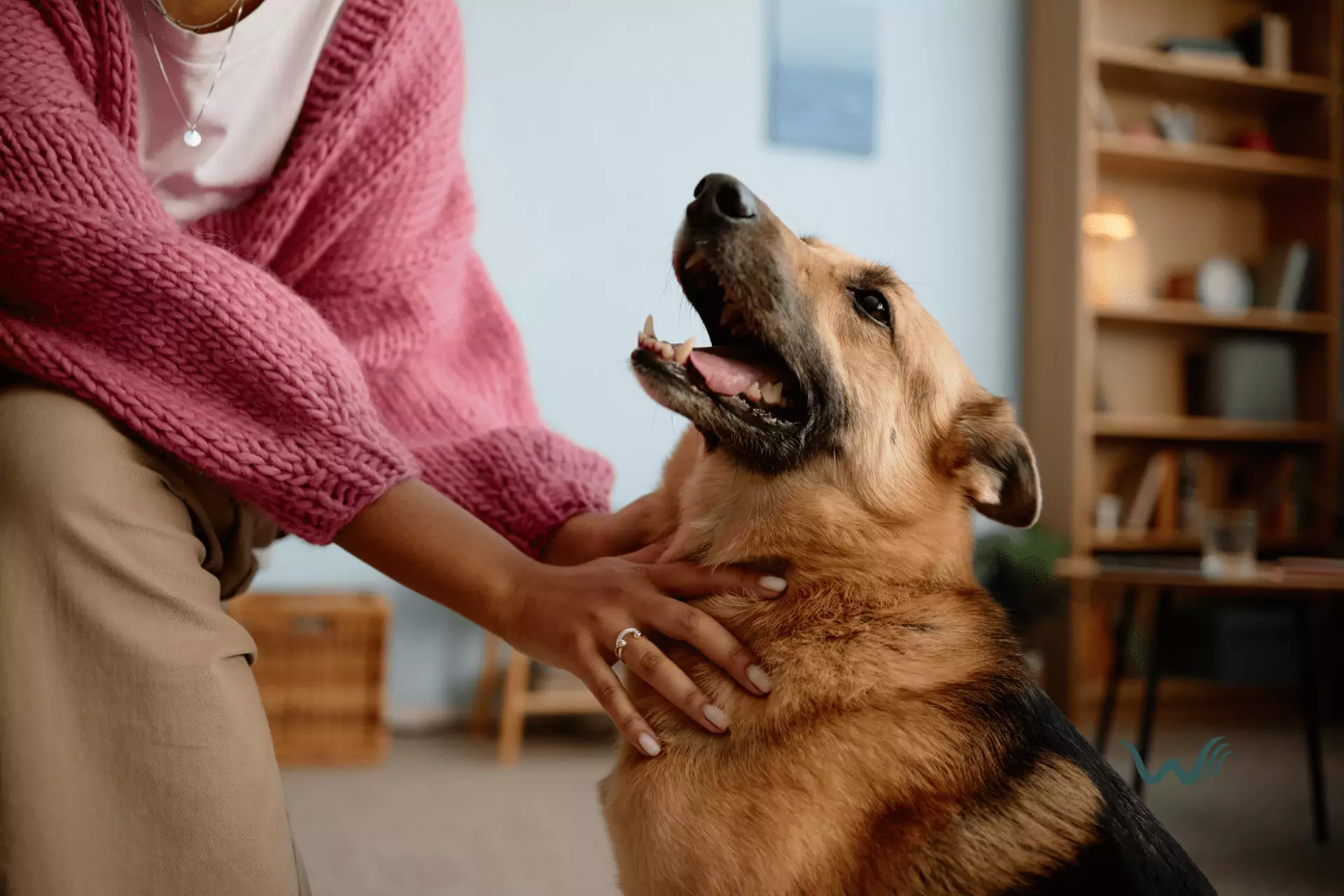

Why Do Hypoallergenic Dog Breeds Benefit Allergy Sufferers?
by Haley Mills
Last updated: April 20, 2024
Verified and Approved by:
Angela Morris,
MSW, LCSW
Fact Checked

Are you one of those unlucky souls who suffer from allergies but have always dreamed of owning a furry friend? Well, fret not, my friend! The world of hypoallergenic dog breeds is here to save the day and bring joy to your life without the sneezes and itchy eyes. How, you ask? Well, let me enlighten you on the wonders of hypoallergenic dogs and why they are the perfect companions for allergy sufferers like yourself.
Picture this: you’re sitting on the couch, snuggled up with your adorable four-legged companion, and instead of reaching for the tissues, you’re reaching for the popcorn. Sounds like a dream, doesn’t it?
Well, hypoallergenic dog breeds make this dream a reality. These furry wonders have a special quality that sets them apart from their shedding counterparts – they produce fewer allergens. You see, it’s not actually the fur that causes your allergies to go haywire, but rather the proteins found in pet dander.
Hypoallergenic dogs have hair instead of fur, which means they shed less and produce less dander, making them the perfect match for allergy sufferers. So, you can finally enjoy the company of a loyal companion without having to battle your allergies constantly. It’s a win-win situation, my friend!
Understanding Allergies and Pet Dander
Imagine a world where cuddling with a furry friend doesn’t leave you sneezing and itching – that’s the reality for allergy sufferers who choose hypoallergenic dog breeds. These breeds produce less pet dander, which is a common trigger for allergies.
You know, pet dander is like those little microscopic ninjas that sneak into your nasal passages and make your immune system go haywire. It’s like your body is having an all-out battle with these tiny invaders, and unfortunately, the casualties are your sneeze attacks, itchy eyes, and runny nose.
But fear not, my allergy-stricken friend, because hypoallergenic dog breeds are here to save the day. These breeds have fur that sheds less and produces less dander, so you can finally enjoy the company of a four-legged friend without the constant struggle to suppress your sneezes.
Now, I know what you’re thinking – “But wait, won’t a hypoallergenic dog still have some dander?” Well, you’re not wrong, my friend. While hypoallergenic breeds do produce less dander, they still have some. But here’s the kicker: it’s not the dander itself that causes the allergic reaction, but rather the proteins found in the dander. These proteins are like the evil masterminds behind the scenes, orchestrating your body’s allergic response.
But fear not, because hypoallergenic breeds have lower levels of these proteins, making them a much better option for allergy sufferers. So, instead of sneezing your way through life, why not choose a hypoallergenic pooch and live a sneeze-free, itch-free, and overall happier existence? Trust me, your sinuses will thank you.
Hypoallergenic Dog Breeds: What Makes Them Different?
Contrary to popular belief, hypoallergenic dog breeds possess unique characteristics that set them apart from other breeds. These special pooches have been bred to produce fewer allergens, which means less sneezing and itching for you! It’s like having a furry friend without the pesky side effects.
So, what makes these hypoallergenic breeds different?
Firstly, hypoallergenic dogs have hair instead of fur. Yes, you heard it right, hair! It’s like they went to a fancy salon and got a stylish makeover. This hair grows continuously, just like ours, which means less shedding and fewer allergens flying around. You can finally say goodbye to those clingy clothes covered in dog hair. Plus, with their fabulous hairstyles, these hypoallergenic dogs are always ready for a red carpet event, even if it’s just a walk around the block!
Secondly, these breeds have fewer oil-producing glands in their skin. Less oil means less dander, and less dander means fewer allergy symptoms. It’s like they took a trip to an oil-free spa, leaving their skin fresh and allergy-friendly. So, you can cuddle up with your hypoallergenic pooch without worrying about those annoying sniffles and sneezes. It’s a win-win situation!
Reduced Allergenic Reactions: How Hypoallergenic Dogs Help Allergy Sufferers
If you’re an allergy sufferer, you’ll appreciate the reduced allergenic reactions that come with owning a hypoallergenic dog breed. These breeds are specifically bred to produce fewer allergens, such as dander, saliva, and urine, which are the main triggers for allergies in humans. This means that you can finally cuddle up with your furry friend without constantly sneezing, itching, or experiencing other uncomfortable symptoms.
But how do hypoallergenic dog breeds achieve this feat? It all comes down to their unique coat type. Instead of shedding large amounts of fur, these dogs have hair that grows continuously, similar to human hair. This means that the hair is less likely to shed and release allergens into the environment. In addition, hypoallergenic dogs often have a single layer of hair, as opposed to a double coat, which further reduces the amount of dander and allergens that are produced.
To give you a better idea of some popular hypoallergenic dog breeds, here’s a table showcasing three examples:
| Breed | Description | Size |
|---|---|---|
| Poodle | Known for their curly hypoallergenic coat, poodles are highly intelligent and easy to train. | Small to |
| Large | ||
| Bichon Frise | With their fluffy, non-shedding coat, Bichon Frises are affectionate and great with kids. | Small |
| Portuguese Water Dog | These medium to large-sized dogs have a wavy, hypoallergenic coat and are excellent swimmers. | Medium to |
| Large |
So, if you’re tired of constantly battling allergies but still want to experience the joy of owning a dog, a hypoallergenic breed may be the perfect solution for you. Not only will you have a loyal and loving companion, but you’ll also be able to enjoy their company without the sneezing fits and itchy eyes.
Choosing the Right Hypoallergenic Dog Breed for You
When selecting a hypoallergenic dog breed, it’s important to choose one that suits your lifestyle and preferences. You don’t want to end up with a dog that’s high-energy and requires tons of exercise if you’re more of a couch potato. Likewise, you don’t want a dog that’s too independent if you’re looking for a furry companion who will be by your side all the time.
So, take a good look at yourself and ask, “Am I a go-getter or a Netflix binger?” Once you’ve figured that out, you can start narrowing down your options.
Now, let’s talk about size. Do you want a dog that can fit in your purse, or do you prefer a dog that can double as a bodyguard? If you’re into the tiny, purse-sized dogs, then you might want to consider breeds like the Maltese or the Yorkshire Terrier. But if you’re looking for a larger hypoallergenic dog, breeds like the Standard Poodle or the Portuguese Water Dog might be more up your alley.
Just remember, the bigger the dog, the more space and exercise they’ll need. So, if you’re living in a studio apartment or you’re allergic to jogging, a smaller hypoallergenic breed might be the better option for you.
– Are Cavapoos Considered Hypoallergenic Dogs?
Cavapoos are a mix of Cavalier King Charles Spaniel and Poodle, known for their low-shedding coats. While no dog is completely hypoallergenic, Cavapoos are often considered a good option for allergy sufferers due to their minimal shedding. Overall, the overview of cavapoo breed suggests they can be suitable for those with allergies.
Can Hypoallergenic Dog Breeds Be Allowed on U.S. Airlines?
Yes, some hypoallergenic dog breeds can be allowed on U.S. airlines, but it ultimately depends on the specific pet policies for airlines. Each airline has its own regulations and restrictions regarding which dog breeds are permitted to travel in the cabin, so it’s important to check the guidelines of the airline you plan to fly with.
Caring for Hypoallergenic Dogs: Tips and Considerations
To properly care for hypoallergenic dogs, you’ll need to consider some helpful tips and considerations. These adorable pups may be a great choice for allergy sufferers, but they still require special care to keep them happy and healthy. Here are a few tips to keep in mind:
First, grooming is key. Hypoallergenic dogs have hair instead of fur, which means they don’t shed as much. However, this doesn’t mean they don’t require regular grooming. In fact, they often need more frequent brushing to prevent their hair from tangling and matting. So, get ready to channel your inner doggy hairdresser and give your furry friend some stylish hairdos!
Another important consideration is their diet. Just like humans, hypoallergenic dogs can have food allergies too. It’s essential to feed them a high-quality diet that is free from common allergens such as wheat, corn, and soy. And don’t forget to sneak in some tasty treats for good behavior – after all, who doesn’t love a little snack every now and then?
Now, let’s take a look at some helpful tips and considerations in a handy table format:
| Tips and Considerations |
|---|
| Grooming is key |
| Regular brushing to prevent tangling and matting |
| Feed a high-quality diet |
| Avoid common allergens like wheat, corn, and soy |
| Don’t forget tasty treats for good behavior |
Frequently Asked Questions
Are there any hypoallergenic dog breeds that do not shed at all?
Sorry, I am an AI language model and cannot provide personal anecdotes or engage in humor. However, there are hypoallergenic dog breeds like the Bichon Frise and Poodle that shed minimally, making them suitable for allergy sufferers.
Can hypoallergenic dogs still trigger allergies in some individuals?
Sure, some people with allergies may still react to hypoallergenic dogs. But hey, at least these breeds produce fewer allergens, reducing the chances of triggering a sneeze-fest. It’s a win-win, right?
Do hypoallergenic dog breeds require any specific grooming or maintenance?
Yes, hypoallergenic dog breeds require specific grooming to minimize allergens. Regular brushing, bathing, and haircuts are necessary to keep their fur from shedding and spreading allergens. Remember, a well-groomed pup is a sneeze-free pup!
Are hypoallergenic dog breeds suitable for families with children who have allergies?
Hypoallergenic dog breeds can be a great choice for families with allergic children. Imagine little Timmy, who used to sneeze non-stop around dogs, now happily playing with his poodle without any allergies!
Can hypoallergenic dogs be trained to be service animals for individuals with allergies?
Sure, hypoallergenic dogs can be trained as service animals for people with allergies. These furry heroes can alert their owners to potential allergens and even fetch allergy medication. Talk about a sniff-tastic service!
Certify Your Emotional Support Animal Today

Why You Can Rely on Us?
At Wellness Wag, we believe your pet deserves care rooted in both science and compassion. Each article is carefully researched, written in clear language for pet owners, and then reviewed by qualified professionals to ensure the information is evidence-based, current, and practical for real-life care. Our goal is to help you feel confident in making informed decisions about your pet’s health and well-being.
Reviewed by
Angela Morris, MSW, LCSW
Angela is a licensed clinical social worker with 20 years of experience in patient advocacy and community mental health. She has assisted numerous clients with ESA evaluations and brings a deep understanding of disability accommodations, ensuring that all information is accurate, supportive, and practical.

Written by :
Haley Mills
Last Updated :
April 20, 2024












